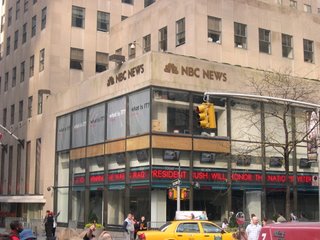The media definitely made a mess of the coverage of the West Virginia mine disaster. By jumping the gun and not checking their sources, they created more unneccessary pain for the family members of the miners. It was so much worse than the usual "you just lost your husband, now how do you feel?" type of situation. I can't even imagine what the poor family members went through--such majors highs and lows. We need to look at some major things: reporter emotions, immediacy, laziness, and common sense.
((Before I go on, one thing. Not to try to make the media's action seem okay, but I feel like it is important to note that word would have gotten to the family members anyway. It's not as if they found out about it for the first time by reading the front page of the USA Today. They would have gone through the same high when they heard all the miners were alive, then the same low when they realized that wasn't true. But I realize that’s not the point here.))
Reporter emotion: Could some of this situation be blamed on the reporters getting too emotional with the story? I'm gonna have to say no. I'm sure the reporters/anchors/producers were very caring on the situation. It was terrible and one would have to be stone to not feel something for the miners and their families. But, in this situation, I don't think we can blame the media blunder on too much emotion. I think the reporters were more focused on getting the story our instead of getting caught up in the jubilations of the family members and just not being able to stop themselves from reporting what they heard. It had more to do with the deadline driven environment that journalists work in today.
Immediacy: Immediacy has almost become all there is in the media. If you don't break the story first, then you lose. This win/lose mentality has created these racing, power hungry reporters/anchors/producers who sit on the edge of their chairs waiting to spit out the latest before their competition can. Instead of taking the time to check with officials and get the facts straight, they broadcast completely wrong information—but hey, they did it first, right? And sometimes I have to wonder if this deadline-obsessed business is making things unnecessarily harder for itself. Does the audience really sit there waiting to see who breaks the story first and then is loyal to only that station or paper? Is the audience really that insistant on getting the story the second it happens? I realize that in many situations, people could depend on breaking news for their own safety, but why must there be the obsession to be the first to break every story? It seems to me like a lot of that obsessivness is in the minds of the broadcasters themselves and that the public would be okay with them taking the extra few seconds to get their facts straight. But maybe that’s just me.
Laziness: Where was the double checking? Where was the official word? This situation was almost like a big game of telephone! “Well I heard from him who heard from his mom’s second cousin who talked to the governor who was right there when they got word.” On CNN.com, the un-corrected article (
http://www.cnn.com/2006/US/01/03/mine.explosion) (which I can still access over a day later—shouldn’t they have taken this incorrect article off the website?) says that Anderson Cooper found out about the living miners from “A friend of one of the miners…who did not give his name.” How’s that for a weak source?
Common Sense: Should the media have been a little more skeptical of this sudden news? The media themselves told the public earlier about how the rescue team was getting no response from the miners and that there was three times the lethal amount of carbon monoxide down there. After reporting this, they didn’t stop to think that the news of 12 living miners was a little bit unusual? With their experience with tragic incidents that usually don’t end so miraculously, shouldn’t they naturally be a little bit more skeptical then maybe the miners’ family members? This skepticism could be a good thing because it would really force them to do some more digging and fact finding.
The Devil’s Advocate: The media messed up—but what about their side? Who should the media trust for information on breaking news stories like this one? Who is the most official official in such a situation? West Virginia’s Gov. Joe Manchin said himself that he had been told 12 of the miners survived the disaster. So did state Rep. Shelley Moore Capito who was at the scene that whole time. If the media couldn’t have trusted their word, who should they have gone to? Someone on the rescue team? Maybe the International Coal Group Chief Executive Officer Ben Hatfield? Yes, the media jumped the gun and caused a mess and should have done more to confirm what they heard, but a part of me feels like they’re not completely in the wrong. Shouldn’t some of these sources be reliable and be blamed themselves because they were the ones with the erroneous information which the media just reported?
Hopefully this situation can be turned into something positive. The media seems to be like a train with no breaks gaining speed on a down hill track. Competition is getting more and more fierce. Every last second counts when it comes to breaking the story before anyone else. Maybe people in the media—and, even more importantly, people aspiring to be a part of the media in the future—can take a step back and away from the craziness to realize all that went wrong in this situation. Maybe it can lead to more responsible reporting, with emphasis placed on getting it right instead of getting it first. I’m inclined to think that this one situation isn’t enough to the stop the media train, but maybe it’ll slow it down just a little bit.

 The office, where all the business gets done.
The office, where all the business gets done. A picture of me hard at work at my desk. I tried to take it quickly so no one would see me do it...I didn't want to be the weird intern who takes picture of herself at her desk. Luckily, no one saw. :)
A picture of me hard at work at my desk. I tried to take it quickly so no one would see me do it...I didn't want to be the weird intern who takes picture of herself at her desk. Luckily, no one saw. :)


